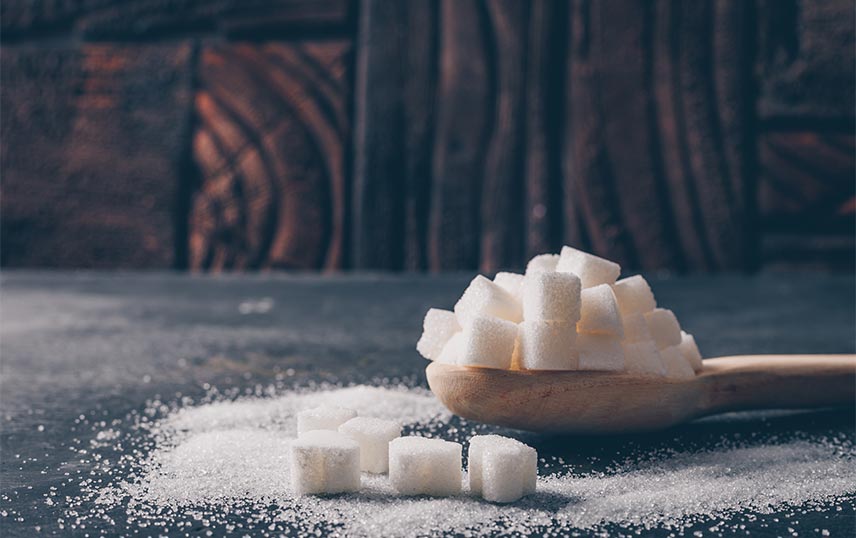Facts about sugar and sugar substitutes
Sugar is a pure carbohydrate obtained from sugar beet or sugar cane. It is marketed as granulated sugar, sugar cubes and powdered sugar. It is a quick energy for the body, gives our food and drinks a pleasant taste, adds texture and even has a preservative effect.

Most people find it hard to say no to a bite, which is no wonder, since it is evolutionary beneficial to prefer sweet flavours. This is because the sweet taste is supposed to be non-toxic and indicates a source of carbohydrate-rich food that can be well utilized.
According to the WHO (World Health Organization), sugar should not account for more than 10 percent of your daily calorie intake. This means 50g of sugar per 2000 kcal.
But nowadays many foods contain hidden sugars, not only soft drinks and sweet snacks. If you want to give up sugar or reduce your intake, it's not enough to pay attention to the sugar cubes in coffee or tea, because processed foods are full of hidden sugar. Many people make the mistake of thinking they are eating sugar-free by eliminating or replacing the sugar they use at home, but in fact they take a lot of sugar in their bodies unnoticed in the form of processed foods. Although most sugar is absorbed in the form of soft drinks, hidden sugars can also be found in foods such as instant soup powders, salad dressings and even meat products. Did you know that even with 2 dl of 100% fruit juice we consume almost half of our daily sugar intake?
HOW DO I KNOW THERE IS HIDDEN SUGAR IN FOOD?
Processed sugar or added sugar syrup can appear on food labels in a variety of ways, so it is not enough to look for the word sugar. Most often, the tell-tale sign is some ingredient ending in -ose: fructose, glucose, maltose, lactose, sucrose...
These are the most commonly used simple sugars, which you can easily find on food labels. Various syrups are also often used for sweetening, so you may want to pay attention to this too.
Awareness is also very important because many times even foods considered healthy contain hidden sugar, such as muesli bars, granola, various cereal products, light and diet foods, dried fruits, flavoured yoghurts, but it can even be found in fruit teas.
Since the only provide empty calories to the body and do not contain any valuable nutrients, it is definitely worth shopping with an open mind and reducing your intake of added sugar.
WHY REPLACE SUGAR?
The recommended daily sugar intake is mentioned above. Unfortunately, there is also a high level of overconsumption in Hungary. This significantly increases the amount of calories consumed per day, without having any positive effect on the body. Since it does not contain fibre, vitamins or minerals, it is empty calories.
The negative consequences of excessive sugar consumption have been the subject of many studies, but have also been in the public consciousness for quite some time. Simple carbohydrates and excessive refined sugar consumption cause a sudden rise in blood sugar followed by a rapid drop, leading to fatigue and discomfort. So it's not just guilt that makes you feel bad after snacking. An inadequate diet and excessive sugar intake can put a strain on the pancreas and lead to long-term problems such as weight gain, inflammation in the body, skin problems and frequent tooth decay. It also increases the risk of developing diseases such as insulin resistance, diabetes and heart disease.

NATURAL SWEETENERS
There are many super alternatives to choose from if you decide to give up or reduce your sugar intake. If you still don't want to give up the sweet taste and delicious snacks, we've put together some natural sweeteners for you to choose from.
STEVIA
Stevia is a natural, plant-based, calorie-free sweetener derived from the leaf extract of a South American plant. It can have up to 200-300 times the sweetening power of sugar. It is a perfect sugar alternative, as it is calorie-free, has no effect on blood sugar levels and has a zero glycaemic index. So, people with carbohydrate metabolism disorders and those on diet can also consume it with confidence. It also has a number of positive effects: antibacterial and antifungal, helping to prevent tooth decay, anti-inflammatory and aids digestion. It can be used for both frying and cooking, and its taste does not change when exposed to heat.
GLYCINE
Glycine is the most abundant amino acid in collagen-type proteins. Although not specifically a sweetener, it has become increasingly popular in recent years as a sugar substitute. Glycine is a sweet-tasting protein amino acid, a sugar-like crystalline substance. It has no side flavours, has a sweetening power equivalent to sugar and is heat-resistant, making it suitable for baking and cooking. Unlike other sweeteners, it does not cause intestinal complaints. Positive effects include helping to keep the skin youthful and aiding sleep.
SUGAR ALCOHOLES
The term is misleading: it’s neither sugar nor alcohol. Sugar alcohols are a type of carbohydrate and have a chemical structure that’s similar to sugar. They can occur in both natural – found in fruits and certain vegetables – and artificial forms. They have many positive effects compared to traditional sugar. They raise blood sugar levels slowly, they contain less energy and they do not create an acidic environment in the mouth, so they do not damage teeth or cause decay. In larger quantities, however, it can cause intestinal problems for some people: bloating, diarrhoea, cramps, etc.
XYLITOL
Birch sugar, also known as xylitol, was originally made from the sap extracted from the bark of the birch tree, but is now produced from corn stover. It has the same sweetening effect as sugar, but contains 40% fewer calories. It has a low glycaemic index, barely raising blood sugar levels but causing a minimal insulin response. Absorption is slow, so it helps to keep you feeling full. Because of its energy content, it should be included in the daily carbohydrate intake in case of carbohydrate metabolism disorders.
ERYTHRITOL
Naturally found in fruits such as pears, melons and grapes, but also in certain mushrooms. It looks and tastes very similar to sugar, with a sweetening power of 60-80%. The taste is cool and sweet, with no aftertaste. It is calorie-free, does not raise insulin and blood sugar levels. It is heat stable up to about 160 degrees, so if you bake/cook at higher temperatures than this, you should expect to lose some of its sweetening power.





